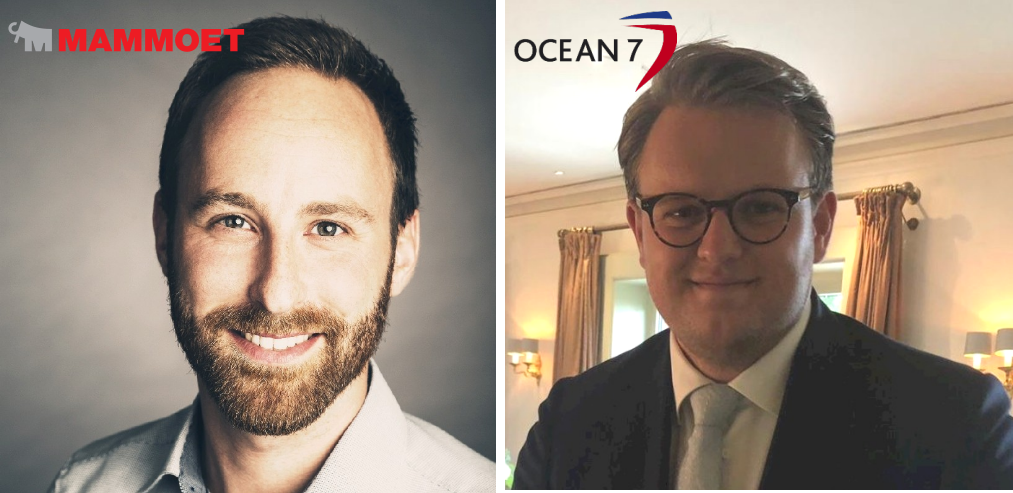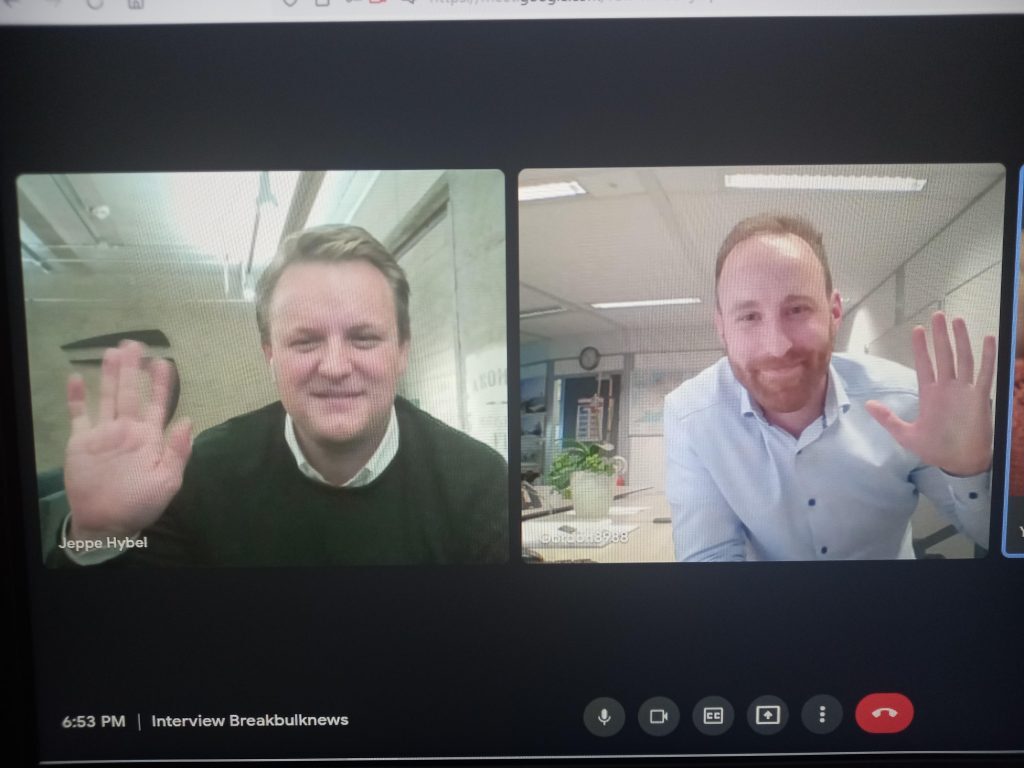
~Where Mammoet and Ocean 7 Projects meet~
In a joint interview with Breakbulk.news, Mammoet’s Global Manager Shipping and Logistics Gordon Dehne (pictured left), and Chartering Director of Ocean 7 Projects, Jeppe Hybel (pictured right) shed light on the various experiences and viewpoints that exist within the shipping industry today.
“This conversation is interesting as it questions how the related industries react and what they experience”, highlights Gordon Dehne. “You often hear the carrier side of the story,” he says, “but not always the charterer’s side. Our contact with Ocean 7 Projects has been great throughout the years. That is why it seemed like a natural choice to ask Jeppe to do an interview together and talk about the current market. To see how we look at it from different vantage points.” Jeppe Hybel confirms, “We like to stay on good terms with other players in the industry. We are in it for the long-term. I have always had a great business relationship with Gordon, so I agreed to it immediately.”
Gordon Dehne comes from Bremen in Germany but lives in Rotterdam, The Netherlands, since 2013. His shipping industry career started in 2009 when he worked at Beluga Shipping in Germany as an apprentice. He says, “I thought it was very interesting what they were doing. But sadly, the company went belly up two years after I joined, and I had to shorten my apprenticeship. Instead, I started studying International Transport Management. And in the course of my studies, I joined Mammoet, as an intern. When I joined Mammoet, I had former Beluga colleagues working at various carriers so that helped me enormously as I suddenly had a big network. I continued with a remote master’s in international Maritime Management and in 2017 I was promoted to lead the shipping department. Today this role encompasses all modes of transport.
Danish native Jeppe Hybel commenced as a trainee in shipping in 2011, together with Stefan Petersen, who is now the owner of Ocean 7 Projects. Today Jeppe Hybel lives in Hamburg, Germany with his girlfriend and two-year-old daughter. He explains: “After working for three years in Denmark, I started up our German office in 2014. I was joined by our Head of Operations, Micki Hellerup, in 2015. And now we have nine people working with us here in Hamburg. And the Ocean7 brand has expanded with offices in ten different countries. So, you can definitely say the journey has been exciting.”
A volatile market
This past year has been a tough one for the global shipping market with COVID-19 impacting the industry deeply. And, as Jeppe Hybel points out, the main question that arises today is: what does the future hold in store for the industry and who will be here in two years if this situation continues? He clarifies, “I think this year we have seen a transition period: and we have gone from being the underdog for the last ten years to actually being on top. I do think the market needed to change but it has also required an adjustment of our mentality and way of working, trying to keep our service level as high as possible. We are very aware of how quickly the market turned this time around and so we constantly analyse what is happening to help us prepare for the next change. We want to keep a fleet afloat with a decent number of ships but with the increasing charter rates we still must do sensible business. And we want to hold on to the ships we still believe in.”
Gordon Dehne adds, “The market has been extremely volatile. And the transition period is the most difficult time. As a charterer we were very aware of the difficult market the shipping companies and carriers had to navigate in with some of them on the verge of going bankrupt. Charterers have no interest in such an unsustainable market either as it deteriorates competition as well as quality. The low freight levels and continuously available tonnage are welcome but only seeing those aspects is short term thinking. With the current drastic change in the shipping market the risk of carriers going bankrupt is low. But the burden is now on charterers who are suffering from cost-overruns and, even worse, scheduling uncertainty and delays due to non-available tonnage. Also, the necessity to book ships way in advance doesn’t help as they might run late, which has financial impact, or causes cancellations in the port of loading, for example.”
Developing Opportunities
“But I do think this past year also created new opportunities and has left us in a good position because the market is more consolidated now,” says Jeppe Hybel. “We’re still going to see a need for multipurpose ships in the future. Not for building an overcapacity but to try to find some kind of balance. And it is important to us to know what the next ship type will be that can survive – not just for the next two to three years but for many years to come. This market also teaches us to look at different ownership models and how to operate now and into the future.”
“Yes,” agrees Gordon Dehne, “because the people that have entered the shipping industry in the last year only know the bad times, but the ones that have been in shipping for a longer period of time can see both sides, and that teaches us a lesson. It tells us how to look at the business from different viewpoints.”
Jeppe Hybel nods and says, “What keeps me motivated every day is the fact that I am constantly challenged to come up with solutions. And the fact that we have built such a great team over the years. They have become more than just colleagues to me, especially since last year when we all had to bite the bullet, find a way to conquer the obstacles together and got to share our joy when we did. And I also appreciate the comradery I have with others in this industry despite the tough times and challenging situations we are going through. Like with Gordon for example, when we talk on the phone together, and we discuss the good and the bad sides of this current market not only through the eyes of a carrier or a charterer but very objectively. That helps to understand each other better and creates trust so that we truly become partners rather than having a client versus subcontractor relationship.”
The weight of transparency and digitisation
Asked about the transparency of the business and what they want to do to improve it, Jeppe Hybel replies that transparency can also be a burden. He justifies, “It would be stupid to say that technology is not a solution in the future because if you look back, you can easily see what technology has brought us so far. But I really have difficulties to see that what we do on a day to day basis can be put into an automated or semi-automated system. The cargoes change every single day and even if we are talking about the same cargo commodity, the composition and the quantity is different. I think human interaction and knowledge is essential when it comes to project shipping because of the complexity of it and I also believe this is what many colleagues around the world really enjoy about their job.”
Dedicated to a green future
“I’d rather focus on how to deal with the next big challenge, climate change. With the emphasis on surviving the market impacted by COVID-19 this past year and a half, our focus shifted away from global warming”, says Jeppe Hybel. “But it is time to shift it back. With the CO2 emissions at the forefront of our minds today I can imagine that is going to play a role in the natural selection of vessels. Few of us really know what rules or regulations we are going to have to abide by in the next five to ten years.”
“We are in the transition period where we concentrate more on renewable energy, adds Gordon Dehne, “and there is the professional side of me that will look at the numbers and the challenges of this shift, but personally I really love the projects where Mammoet actively participates in a country’s energy transition towards a more sustainable power production by providing the assets and the engineering to lift and move large and heavy components. Because then I feel I can contribute. And it is also quite a challenge at the same time. The issue of climate change is something we constantly need to keep in mind as we develop towards the future.”
Jeppe nods and agrees: “And it is about time. We have to figure this out. It might be cliché but having a child gives me a different perspective on the future and what we’re leaving behind for the next generation.”

–

